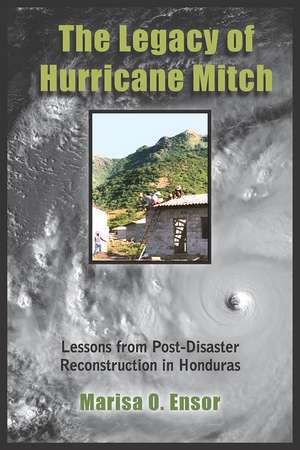The Legacy of Hurricane Mitch: Lessons from Post-Disaster Reconstruction in Honduras
Autor Marisa O. Ensoren Limba Engleză Hardback – 15 dec 2009
Around the world disaster vulnerability is on the rise. The incidence and intensity of disasters have increased in recent decades with lives being shattered and resources being destroyed across broad geographic regions each year.
As it swept across the Honduran landscape, the exceptional size, power and duration of Hurricane Mitch abruptly and brutally altered the already diminished economic, social, and environmental conditions of the population. In the aftermath of the disaster a group of seven socio-environmental scientists set out to investigate the root causes of the heightened vulnerability that characterized pre-Mitch Honduras, the impact of the catastrophe on the local society, and the subsequent recovery efforts. Edited by Marisa O. Ensor, this volume presents the findings of their investigation.
The Legacy of Hurricane Mitch offers a comprehensive analysis of the immediate and long-term consequences of Hurricane Mitch in Honduras. Based on longitudinal ethnographic fieldwork and environmental assessments, this volume illustrates the importance of adopting an approach to disaster research and practice that places “natural” trigger events within their political, cultural, and socio-economic contexts. The contributors make a compelling case against post-disaster recovery efforts that limit themselves to alleviating the symptoms, rather than confronting the root causes of the vulnerability that prefigured the disaster.
As it swept across the Honduran landscape, the exceptional size, power and duration of Hurricane Mitch abruptly and brutally altered the already diminished economic, social, and environmental conditions of the population. In the aftermath of the disaster a group of seven socio-environmental scientists set out to investigate the root causes of the heightened vulnerability that characterized pre-Mitch Honduras, the impact of the catastrophe on the local society, and the subsequent recovery efforts. Edited by Marisa O. Ensor, this volume presents the findings of their investigation.
The Legacy of Hurricane Mitch offers a comprehensive analysis of the immediate and long-term consequences of Hurricane Mitch in Honduras. Based on longitudinal ethnographic fieldwork and environmental assessments, this volume illustrates the importance of adopting an approach to disaster research and practice that places “natural” trigger events within their political, cultural, and socio-economic contexts. The contributors make a compelling case against post-disaster recovery efforts that limit themselves to alleviating the symptoms, rather than confronting the root causes of the vulnerability that prefigured the disaster.
Preț: 378.21 lei
Preț vechi: 510.27 lei
-26% Nou
Puncte Express: 567
Preț estimativ în valută:
72.37€ • 77.39$ • 60.34£
72.37€ • 77.39$ • 60.34£
Carte indisponibilă temporar
Doresc să fiu notificat când acest titlu va fi disponibil:
Se trimite...
Preluare comenzi: 021 569.72.76
Specificații
ISBN-13: 9780816527847
ISBN-10: 0816527849
Pagini: 240
Dimensiuni: 152 x 229 x 20 mm
Greutate: 0.45 kg
Ediția:1
Editura: University of Arizona Press
Colecția University of Arizona Press
ISBN-10: 0816527849
Pagini: 240
Dimensiuni: 152 x 229 x 20 mm
Greutate: 0.45 kg
Ediția:1
Editura: University of Arizona Press
Colecția University of Arizona Press
Notă biografică
Marisa O. Ensor is an assistant professor of anthropology at the American University in Cairo. She has researched and published on disaster-, conflict-, and development-induced displacement in Latin America, North Africa, Spain, and the United States.
Cuprins
List of Figures
List of Tables
Preface
1 Understanding Hurricane Mitch: Complexity, Causality, and the Political Ecology of Disaster
Anthony Oliver-Smith
2 Hurricane Mitch: Root Causes and Responses to the Disaster
Bradley E. Ensor and Marisa Olivo Ensor
3 From Natural Events to “Natural” Disasters: Assessing Environmental Vulnerability in Honduras
Manuel Winograd
4 A Flood of Impressions: Riding Out Mitch and Its Aftermath
William M. Loker
5 Post-Disaster Reconstruction: An Opportunity for Political Change
Vilma Elisa Fuentes
6 Gender Matters in Post-Disaster Reconstruction 129
Marisa Olivo Ensor
7 Tin Roofs, Cinder Blocks, and the Salvatrucha Gang: The Semiotic-Material Production of Crisis in Post–Hurricane Mitch Reconstruction
Roberto E. Barrios
8 The Legacy of Mitch: Conclusions for the New Millennium
Marisa Olivo Ensor, Bradley E. Ensor, Vilma Elisa Fuentes, and Roberto E. Barrios
About the Contributors
Index
List of Tables
Preface
1 Understanding Hurricane Mitch: Complexity, Causality, and the Political Ecology of Disaster
Anthony Oliver-Smith
2 Hurricane Mitch: Root Causes and Responses to the Disaster
Bradley E. Ensor and Marisa Olivo Ensor
3 From Natural Events to “Natural” Disasters: Assessing Environmental Vulnerability in Honduras
Manuel Winograd
4 A Flood of Impressions: Riding Out Mitch and Its Aftermath
William M. Loker
5 Post-Disaster Reconstruction: An Opportunity for Political Change
Vilma Elisa Fuentes
6 Gender Matters in Post-Disaster Reconstruction 129
Marisa Olivo Ensor
7 Tin Roofs, Cinder Blocks, and the Salvatrucha Gang: The Semiotic-Material Production of Crisis in Post–Hurricane Mitch Reconstruction
Roberto E. Barrios
8 The Legacy of Mitch: Conclusions for the New Millennium
Marisa Olivo Ensor, Bradley E. Ensor, Vilma Elisa Fuentes, and Roberto E. Barrios
About the Contributors
Index
Recenzii
“There are few works of such importance that detail the ongoing impacts of natural disaster events, let alone provide an assessment of country-wide impacts of a natural disaster. This book also provides a critical perspective on the failure of development strategies that proceed without consideration of potential vulnerabilities—both those created by development and those exacerbated by it. It also reveals the resilience of the poorest victims and provides lessons learned on adaptability and coping that force a re-examination of the very nature of resilience as defined by disaster response experts.”—Christopher Dyer
Descriere
The Legacy of Hurricane Mitch offers a comprehensive analysis of the immediate and long-term consequences of Hurricane Mitch in Honduras. Based on longitudinal ethnographic fieldwork and environmental assessments, this volume illustrates the importance of adopting an approach to disaster research and practice that places “natural” trigger events within their political, cultural, and socio-economic contexts. The contributors make a compelling case against post-disaster recovery efforts that limit themselves to alleviating the symptoms, rather than confronting the root causes of the vulnerability that prefigured the disaster.
